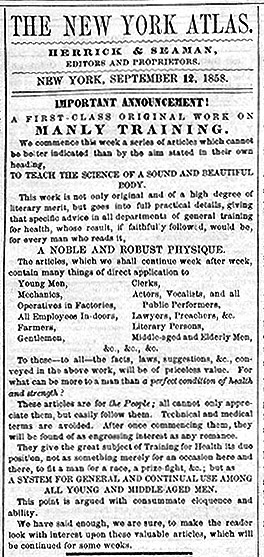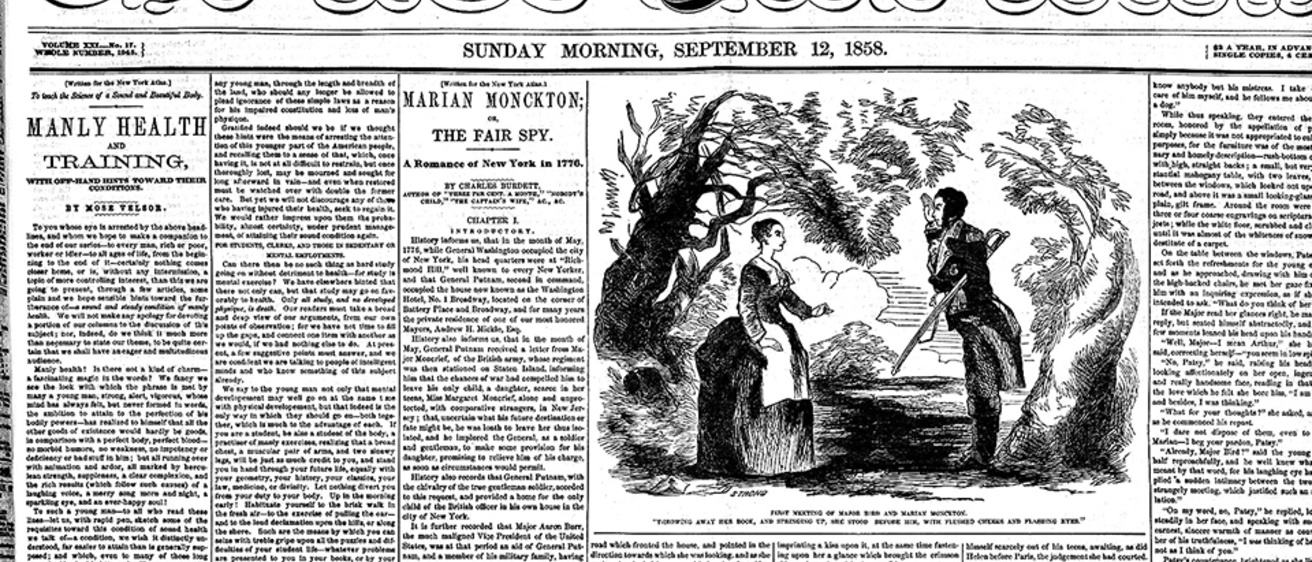Previously unknown to Whitman scholars, a 13-part journalistic series entitled Manly Health and Training is now republished and newly attributed to Walt Whitman.
Zachary Turpin, a Ph.D. candidate in English at the University of Houston, recently discovered the book-length series, which appears in its entirety in the most recent issue of the Walt Whitman Quarterly Review (WWQR).
WWQR is an open-access, peer-reviewed journal—and the international journal of record in Whitman Studies—edited by Ed Folsom, Walt Whitman scholar and the Roy J. Carver Professor of English at the University of Iowa.

The 47,000-word-long Manly Health and Training stands as a substantial new find that may bridge gaps in the poet’s biography and change the way readers understand Whitman’s writings from this period. For example, some of the material from the 1858 Manly Health series corresponds with subject matter also found in Whitman’s personal notes on health and the body.
Manly Health and Training originally appeared as a series in The New York Atlas, a 19th-century Sunday newspaper published in New York City. Each installment in the series appeared with the byline “Mose Velsor of Brooklyn,” a pen name Whitman was known to have used occasionally for newspaper articles.
Turpin’s find, 158 years after the original publication of Whitman’s articles, shows that much remains to be discovered even about well-known authors like Whitman.
Born in print, shared online
The discovery and re-release of Whitman’s work highlight changes in the transmission of writing, from Whitman’s hand-inked papers to the printing presses at the Atlas, and eventually from microfilm to the University of Iowa’s online journal, the Walt Whitman Quarterly Review.
The Benefit of Open Access
In the future, Manly Health and Training will also be available in the Walt Whitman Archive, a collaborative project that started in the mid-1990s between Folsom at the University of Iowa and Kenneth M. Price, Hillegass University Professor of American Literature at the University of Nebraska–Lincoln.
“I look forward to working with the UI Libraries’ Digital Scholarship & Publishing Studio to make the full transition to a new-old journal, available worldwide to anyone interested in Whitman,” says Folsom. “The journal is now taking a giant step toward realizing Whitman’s dream of free and equal access to the ongoing understanding of the ever-evolving democratic writing that Whitman initiated, nurtured, and continues to sustain.”
In WWQR, Turpin provides a detailed introduction to Manly Health and Training, noting that surviving issues of the Atlas are rare today, even on microfilm. Turpin was using one of the few remaining reels containing the newspaper, currently held by the American Antiquarian Society, when he found Manly Health and Training.
Research libraries such as the University of Iowa’s work to preserve, digitize, and create searchable records of archival materials in all formats to present work like Whitman’s to the widest audience possible. Such a mission echoes Whitman’s writings, which champion democratic values of equal access to books, ideas, and all forms of human endeavor.
Fitting, then, that Folsom and WWQR’s managing editor Stefan Schöberlein made the forward-thinking move to transition WWQR from print to online-only in October 2015. More about WWQR’s move to open access.
With the help and support of the University of Iowa Libraries’ Digital Scholarship & Publishing Studio, Folsom and Schöberlein worked with digital humanities librarian Stephanie Blalock and others in the studio to produce the online journal. According to Blalock, moving away from print meant eliminating the costs associated with print, while allowing the journal to publish more material in each issue.
As a result, the journal’s editors are now able to publish the full text of Whitman’s Manly Health and Training in a single issue, sharing this newly discovered piece of the poet’s writing with an ever-growing international body of Whitman readers who access his work via an internet connection.
Read Blalock’s blog about the full-text publication of Whitman’s Manly Health and Training in WWQR.
Additional resources
Whitman’s Letters: The Collaboration of the Walt Whitman Archive Correspondence Team: http://blog.lib.uiowa.edu/studio/?s=stephanie+blalock
About the WWQR: http://ir.uiowa.edu/wwqr/about.html
About the Walt Whitman Archive: http://www.whitmanarchive.org/
About the University of Iowa Libraries’ Digital Scholarship & Publishing Studio
The Digital Scholarship & Publishing Studio serves faculty, student, and community scholars with an expert staff and access to a range of digital tools and platforms.
A centrally funded campus resource, the studio also houses the Studio Scholars Program, a faculty research group dedicated to the development of both large- and small-scale faculty projects related to Digital Humanities (DH) efforts in the arts and humanities.
A team at the Digital Scholarship & Publishing Studio worked to transition the WWQR from print to online-only and open access. Stephanie Blalock, a Whitman scholar and digital humanities librarian, provided collaborative direction, working with both the studio and the journal’s editors. Wendy Robertson, digital scholarship librarian, prepared the journal and its metadata for digital publishing, and Heidi Bartlett, creative coordinator, contributed graphic design.
